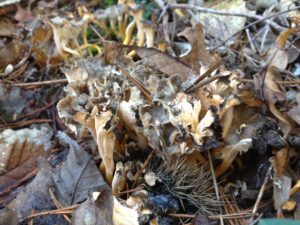Happy Autumn Equinox!

Winter chanterelle – an Autumn harvest
When does Autumn start? For those unlucky enough to have been looking forward to a lovely summer holiday in England, early August was very Autumnal – with cold weather, heavy rain and leaden skies.
Officially Autumn starts today (September 22nd) – on the Autumn Equinox. Equinox means that the day is the same length as the night – and from here on the days are shorter, the nights are longer – all the way through to the Winter Solstice, just before Christmas. While this might seem to be irrelevant to our modern lives, when we have access to 24 hour light (if need be) and can turn on the heating at the flick of a switch, we might be surprised how important these changes are, and how we are affected by them, without realising it.
For the rest of nature, the Equinox is a signal to take action – to start shutting down, to produce fruit, or to make a move to a warmer place. Many animals start preparing to hibernate at this time of year. The Dormouse (Dor from the French verb Dormir – to sleep) will be eating as much as possible of its favourite foods, like hazelnuts and blackberries, fattening up in preparing for hibernation. Hedgehogs will be eating their favourite foods – slugs and snails, putting on as much weight as they can before they hibernate too. Mushrooms and Toadstools produce their “fruit” in Autumn – that is the caps on stems (and other weird and wonderful shapes) that push through the soil and release their spores into the air. Birds will be moving, individually or in flocks, gathering on the coast, waiting for the right weather conditions, to help them on their way, to southern Europe and sometimes much further.
Before the advent of artificial light and easily available heat, humans would also use the Equinox as a signal to start preparing for winter, stocking up on food and fuel. Further back still, our ancient ancestors would have eaten as much as they could while food was plentiful, preparing for those long lean months ahead. Have these instincts completely disappeared, or are there still signs in our modern behaviour and lives, of our ancestors preparing for the winter? Some people certainly feel the effects of the turning season more than others. Seasonal Affective Disorder describes a serious health condition which is also known as Winter Depression, and includes symptoms such as fatigue, irritability, low mood and craving carbohydrates – this last symptom may be related to those ancestral urges to feed in preparation for a winter which required those fat stores to be used just in keeping warm. Even those of us who do not get SAD will be affected by the changing season, however subliminally. One way to minimise the effects is to get out into the daylight as much as possible. And while we are enjoying a bit of extra light, we can also feel the season changing, in the wind, in the falling leaves, and in watching those birds heading off to warmer climes.
originally published at Lush Times

Comments are closed.